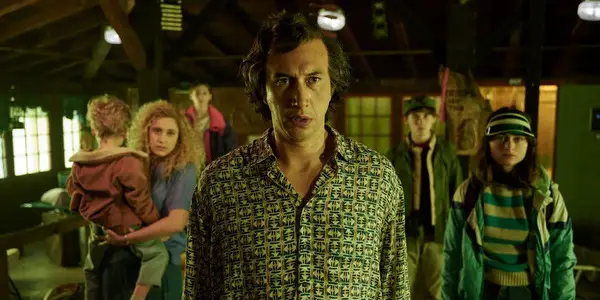It’s hard to imagine Noah Baumbach making a film about an impending apocalypse, and this enigma-raveled concept perfectly encapsulates his latest film, White Noise. Weaving together a narrative that sees an ambitious blend in tonalities, Baumbach flexes his creativity as a filmmaker in ways that we have certainly not seen in his illustrious oeuvre of work thus far. He doesn’t quite swing for the fences but certainly aims in that direction. The result isn’t exactly flawless, but White Noise manages to playfully captivate audiences in its rather gloomy journey toward understanding the limits of human mortality.
Packing on more weight than we’ve ever seen him do before, Adam Driver plays Jack, a world-renowned Hitler studies academic who lives a relatively mundane life with his wife, Babbette (Greta Gerwig), and four young children (played by Raffey Cassidy, Sam Nivola, May Nivola, and Jodie Turner-Smith). But when an unknown airborne virus befalls their suburban dwellings, they find themselves grappling with possibly physical and most certainly existential distresses. Jack’s academia colleagues (Don Cheadle and André Benjamin) add comedic brevity to the situation, with Don DeLillo, author of the original book the film is based on, sharing a writing credit.
Dissecting The Performative Nature Of Doom
Although not a full-on apocalyptic film, White Noise does tackle society’s often-unguided approach to confronting any major disaster. As the potential threat of a toxic airborne virus starts coming to light, Baumbach depicts all the usual responses one tends to expect. Everything from fear and speculation to pandemonium are featured in the first part of the film before transitioning to a much more introspective exercise. White Noise spends the latter part of its narrative exploring society’s fear of dying and everything that comes with that ideology. In a particularly interesting take, the film even uses infidelity to articulate the death of a marriage and a relationship, adding nuance to an already layered story.

With characters rooted in academia, the film also postulates specifically on the performative nature by which history and current events tend to characterize significant losses in human life. Be it Adolf Hitler’s regime in the past or any horrific accident or murder in present times, society as a whole has a tendency to not look away. And transposing these original ideas of DeLillo’s book to the medium of cinema only helps crystallize this point. Reliving disastrous incidents, in both a fictional or non-fictional format, can be oddly appetizing, whether people want to admit it or not. This is further accentuated in the film by having some of its central characters be oblivious of their own obsessive sensibilities, most notably Driver’s character, who should really know better given his line of work. This almost silly oblivious state of mind is perhaps intentional and serves as a revelation on the normality of such notions.
Ambitiously Creative
While Baumbach’s films have always harbored heavy dramatic undertones, they also tend to carry a burden of restraint. Even with Driver and Scarlett Johansson’s climatic arguments in Marriage Story, that film still paced itself when it came to its overall creative flavorings. White Noise, on the other hand, really bursts at the seams with creative energy. The film is certainly one of Baumbach’s more ambitious and strange storytelling ventures that still maintains his often-theatrical approach to dialogue. The wittily crafted conversations we’re used to seeing in his films is somewhat toned down in White Noise, and instead they’re replaced by more overt style, which ultimately helps articulate the underlying neuroses of the film’s worldview.
This results in a film that veers away from grounded realism, leaning more heavily on surreal narration. Baumbach has a chance to flex his ingenuity as a filmmaker in ways that we have not seen before, taking creative dives that more or less pay off. The film has elements of horror, fantasy and comedy, blending all parts in an affecting manner. All that is to say he really swung for the fences with this one, but maybe not as much as one might have wanted. White Noise is instilled with a unique personality, but on the whole, some of its stylistic choices do feel like half-measures. Given the film’s overall direction, it would have been more fitting if Baumbach had leaped even farther in his creative bounds.
Conclusion
White Noise is a surprisingly playful meditation on our collective fears (and obsessions) with death, a film that is oftentimes uneven but nevertheless engaging enough to inspire strong emotional responses. It’s far from a typical “end of the world” artistic think piece and really demands an introspective look at why the uncertainty of life’s end can be so mesmerizingly haunting. By reaching deep into his own creative depths as an artist, this is essentially Baumbach at his most creative. Personally, I would have liked to see him reach even farther, but it’s nevertheless a promising sign for a filmmaker who continues to evolve.
What do you think of Noah Baumbach’s White Noise? Comment below and let us know.
White Noise will release in theaters on November 25, 2022, and on Netflix on December 30.
Watch White Noise
Does content like this matter to you?
Become a Member and support film journalism. Unlock access to all of Film Inquiry`s great articles. Join a community of like-minded readers who are passionate about cinema - get access to our private members Network, give back to independent filmmakers, and more.